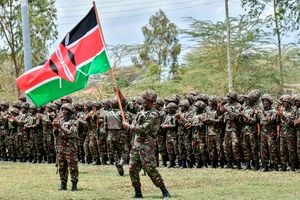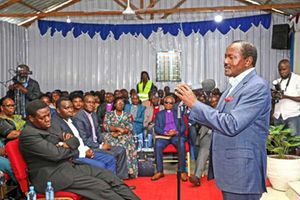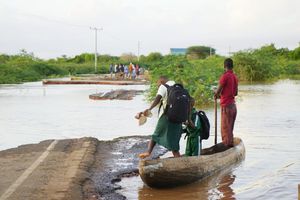Perkerra irrigation farmers resign to nature as dry spell persists

A section of the ploughed bare farms at the mega Perkerra Irrigation Scheme in Baringo South. More than 2,600 acres that is supposed to be under seed maize is yet to be cropped, after water levels at the major water source,- the Perkerra River dropped drastically due to drought and cannot sustain irrigation.
What you need to know:
- For a long time, the Perkerra Irrigation Scheme has grappled with the effects of climate change, from drought to floods in rainy seasons.
- Farmers hope the rains will come, otherwise, they are staring at tough times ahead.
When Michael Saitoti started ploughing his four-acre land in the Perkerra Irrigation Scheme in early February, he was certain that he would proceed to plant seed maize within the March planting season as has been the norm.
He had spent more than Sh68,000 on land preparation, and because farming is his economic mainstay, he aimed to reap more than Sh850,000 from harvests this year.
But Mr Saitoti is among thousands of farmers practising irrigated agriculture under the scheme who are disillusioned, after their major source of water, the Perkerra River, reduced drastically owing to the long dry spell.
The river cannot sustain farming anymore, prompting farmers to wait for the long rains.
The scheme in Baringo County has been a lifeline for thousands of people who directly depend on it for a living, transforming the region’s economy. Its more than 5,800 acres generate more than Sh100 million annually.
Since its inception, the scheme has depended on the Perkerra River as the main source of water, but it can longer sustain farming, especially during dry spells. This has forced farmers to reduce the acreage under crops.
Major towns in the region derive their existence from irrigation schemes in Baringo South that grow maize, onions, rice and vegetables. But major rivers that supply water to the farms have dried up.
For a long time, the scheme has grappled with the effects of climate change, from drought to floods in rainy seasons.
Other irrigation schemes that have also been hit hard by the acute water shortage are Nenteyo, Lebunyaki, Lorrok, Sandai, Mosuro, Eldume, Kamosok and Sukutek.
“Climate change has dealt a big blow to thousands of farmers in Baringo South who solely rely on irrigated agriculture and being the region’s food basket, we are staring starvation in the face,” said Mr Saitoti.
“I have drained all the funds I had on farming, increasing the acreage from two last year to four this year. I was hoping to increase the proceeds but, sadly, the water source cannot sustain farming after its levels dropped drastically.
“We only hope the rains will come, otherwise, we are staring at tough times ahead.”

A section of the drying up Perkerra River. The river is the major supply of water to the mega Perkerra Irrigation Scheme in Baringo South.
Mr Dickson Lekesio, a farmer with 600 acres in the Murda irrigation scheme, said water sources that supply the farms, including the Molo and Waseges rivers, started drying up last year and the little water available is left for livestock and domestic use.
Struggling to make ends meet
He is concerned about the fate of learners who are supposed to report to school in May, noting that many parents who depend solely on farming may not get money to pay school fees.
“Apart from seed maize, farmers also plant onions, tomatoes and vegetables, which act as supplements before they harvest maize. But now that the rivers have dried up, we cannot engage in any farming. Many people are struggling to get money for school fees in the first term, leave alone food,” he said.
He said the water crisis was worsening each day because the long rains are late as the water levels in rivers drop.
“Some farmers had obtained loans from cooperative societies to cultivate their farms and are worried about how they will repay now that the chances of harvesting the crops are slim,” he added.
Many of the water canals that should be flowing with water were completely dry.
Good plans hampered
Perkerra Irrigation Scheme manager Enos Wafula said they had planned to plant more than 2,600 acres with maize this year, up from 2,200 last year, but this has been hampered by the drying up of major water sources.
Last year, he said, the scheme also faced the same challenges, prompting them to request the release of water from the Chemususu dam in Eldama Ravine, more than 100km away, to sustain the crops. They also had to ration irrigation water.
“We were supposed to have started planting seed maize on March 20 but due to the acute water shortage in the Perkerra River, we must wait for the long rains because the little that is available cannot sustain farming and there are no signs of rains in the upper catchment areas that feed the river,” he said.
If the long rains come, farmers are expected to reap big from seed maize after prices were reviewed this year to Sh82 per kilogram, up from Sh76, owing to the increased cost of farm inputs.
Floods
Flooding in lakes Baringo and Bogoria last year affected production at major irrigation schemes in Baringo South, with more than 800 acres under maize destroyed by the rising water levels.
Among the affected irrigation schemes at the time were Perkerra, Loropil, Murda, Nenteyo, Lebunyaki, Lorrok, Sandai, Mosuro, Eldume, Kamosok and Sukutek.
The worst hit was Perkerra, where more than 165 acres under the seed maize programme was washed away by flash floods then.
The government had promised to construct a multibillion-shilling mega dam at Radad in the same constituency to alleviate the perennial water shortages in the irrigation scheme, but the project is yet to kick off.





